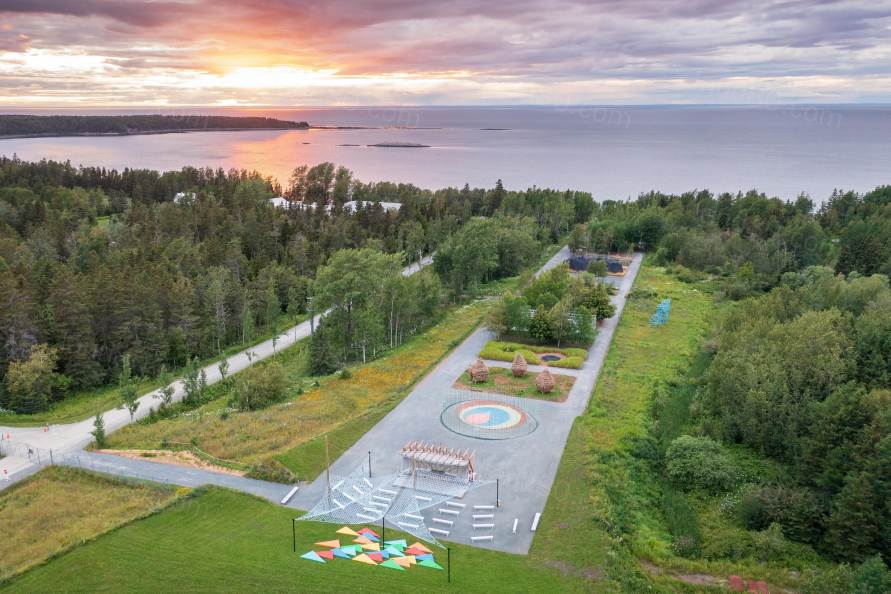第22届国际花园节在加拿大举办,本届的主题是“魔法在门外” (Magic lies outside),旨在为人们带来希望,鼓励创造力,并为这个正在努力克服新冠疫情带来的影响的世界增添色彩。2021年国际花园节特别展出了来自加拿大,美国,法国和瑞典的五个项目。它们被放置到原本既有的花园中,形成一个露天博物馆,并为游客提供了一条参观户外装置的路线。The International Garden Festival is
pleased to reveal the new contemporary gardens of its 22nd edition. Magic
lies outside is the annual theme that aims to bring us hope, to exalt
creativity and to add colour to this world that is struggling to overcome this
global pandemic and to come out of several months of confinement. Five projects have been selected to be part of the 2021 edition of the International Garden Festival from Canada, the United States, France and Sweden. They are added to the current gardens to form an open-air museum, thus offering a route of outdoor installations.

以下是为2021年花展选择的五个新项目:
Here are the five new projects selected for
the 2021 edition:
选择自己的冒险Choose
your Own Adventure
设计:Balmori Associates [Noémie Lafaurie-Debany, Javier Gonzalez-Campana,
Simon Escabi, Chris Liao, Cristina Preciado, landscapers and urban planners]
来自:美国纽约New York, États-Unis

全球变暖及其对所有生物带来的不可否认的影响,以及肆虐全球的新冠疫情,通过改变我们目前与其他生物和自然元素的不和谐关系来应对气候变化:土壤,水,空气,植物和动物至关重要。在经历隔离之后,重新思考我们与自然的联系。我们可以从欣赏身边的自然现象开始:微风,潮湿的树皮,植物散发出的麝香气息,干燥的空气,甜美的气味,发烫的岩石,松脆的砾石......花园在网上发布的静止帧图像,让人联想到十八世纪风景如画的画面。
In the middle of a global pandemic brought
upon us in part by global warming and its undeniable effects on all living
things, fighting climate change by modifying our current toxic relationship
with other living things and elements of nature: soil, water, air, plants and
animals is now critical. Rethinking our connection to nature, after living in lockdown,
can start with appreciating natural phenomena: the gusty wind, the wet bark,
the musky shade, the dry air, the sweet smell, the hot stone, the crunchy
gravels… The garden challenges the still frame images posted on the world wide
web reminiscent of the eighteenth-century picturesque.

Malcolm Andrews将寻找理想景观的游客描述为“将它们'固定'为图画,以便出售或挂在客厅墙壁上的框架中”但美丽的景色可遇不可求,并且通过形成花园的集群、从东到西的种植带结合从南到北的硬质材料,其缺乏固定性和超感官体验得到了增强。选择你自己的冒险,可以通过闻,触摸,听,尝和看感受这座花园。
Malcolm Andrews described tourists seeking
the ideal landscapes as “‘fixing’ them as pictorial trophies in order to
sell them or hang them up in frames on their drawing room walls” (aka
Instagram of the twenty-first century!). But a landscape never happens twice,
and its lack of fixity and hyper sensorial experiences are heightened through
this simple matrix that forms the garden. Running East/West bands of planting
intercepts North/South bands of different hard materials. CHOOSE YOUR OWN
ADVENTURE, smell, touch, listen, taste and see.

干草屋Hässja
设计:Emil Bäckström, architect
来自:瑞典斯德哥尔摩Stockholm, Sweden

人们可以从远处就看到它们,一群未知的但熟悉的生物站在田野里,似乎在等待。它们捕捉到阳光,散发出温暖的金色光芒。风使它们稍微移动,仿佛一个星座中散落的星宿,它们是一个整体,但永远不会太靠近彼此。它们是同类,但各自拥有其独特的形状和表现形式,完美融入自然,当游客足够接近时,可以看到这些生物是由数百万根干草和秸秆组成的,并散发出独特的气味,也可以触摸它们尖锐的结构,或是爬进其柔软的内部。
You can see them from afar, unknown, yet
familiar creatures standing in the field – seemingly waiting. They catch
sunlight and emits a warm golden glow. The wind makes them move slightly. You
see them in a constellation, grouped together, but never too close to each
other. They are the same kind, but each and every one of them have their unique
shape and expression. A piece of nature that has been transformed into
something living. When you get close enough, you can see that the creatures are
made up of millions of individual objects, straws of hay. Moving closer, you
can feel the distinct smell and you can touch both the sharp and soft flesh of
the structures. And then you crawl inside.


新冠肺炎教会了我们很多东西。它暴露了人类与自然、农业和生物多样性重要性的脱节。在全球范围内,人们对传统的、可持续的地球居住方式重新产生了兴趣。Hässja是一个基于这些几乎失传的土壤工作艺术之一的装置——干燥的干草结构。这三个结构由周围的植物组成,不仅具有教育意义,而且它们的形成和排列方式增强了它们的结构性。与普通的干草干燥结构不同,这些结构有一个内部房间。每个空间内部的小空间都为当今提供了一个避难所,并带来了对人类与自然的关系,与过去和未来居住在我们土地上的方式的关系的重新思考。
The covid-19 pandemic has taught us a lot.
It has exposed a disconnection from nature, agriculture and the importance of
biodiversity. All around the globe, a regained interest in traditional,
sustainable ways of inhabiting the earth is emerging. Hässja is an installation
based on one of these nearly lost arts of working the soil – hay-drying
structures. The three structures, made out of the very plants surrounding them,
are not only educational, they are formed and arranged in a way that enhances
their inherited visceral qualities. Unlike normal hay-drying structures, these have
an interior room. The small space inside each provides a refuge from the world
of today, and provides for reflection on man’s relation to nature, to past and
future ways of inhabiting our land.

声镜Miroirs acoustiques
设计:Emmanuelle Loslier, landscape architect, Camille Zaroubi, landscape
architect
来自:加拿大蒙特利尔Montreal (Quebec) Canada


“声镜”(Miroirs
acoustiques)由两个安装在地下的抛物面反射器(再生铝天线)组成。背靠背定位,一个朝向花园(人造环境),另一个指向森林地区和圣劳伦斯河(自然世界)。参观者被邀请体验两种对比鲜明的声音环境。焦点被标记在地面上,向参观者展示最佳站位。参观者可以通过声镜中央的一个孔观察装置另一侧的环境,在此过程中将他们置于最佳位置,以便听到聚焦的声波。
Miroirs acoustiques consist of two
parabolic reflectors (recycled aluminum antennas) planted in the ground.
Positioned back-to-back, one point to the festival, an anthropogenic environment,
and the other points to a forested area and the St. Lawrence. Visitors are
invited to experience the two contrasting soundscapes. The focal point is
marked on the ground showing visitors where to stand. A hole in the centre of
the sound mirrors encourages visitors to observe the environment on the other
side of the installation and, in doing so, places them in the optimum position
to hear the focused sound waves.


开放空间Open Space
设计:legaga [Gabriel Lemelin, Francis Gaignard, Sandrine Gaulin,
architectural interns]
来自:加拿大魁北克Quebec (Quebec) Canada


这个花园的名字说明了一切,“开放空间”是一个字面上和象征意义上的开放空间。在这里,普通房屋内的墙壁被打开,创造出具有无限可能性的开放式平面。设计师只需轻轻一挥魔杖,日常家居用品——门、楼梯、窗户和墙壁,都被赋予新的意义。
The title of this garden says it all — this
installation is a figurative and literal open space. In Open Space, the walls
of a typical house are opened out to create an open floor plan with endless
possibilities. With a flick of a wand, everyday household objects—doors,
staircases, windows and walls—take on new meaning.


幸运物Porte-bonheur
设计:David Bonnard, DE-HMONP architect, Laura Giuliani, landscaper,
Amélie Viale, visual artist
法国里昂Lyon, Villefranche sur Saone and Lissieu, France


“幸运物”Porte Bonheur是现实与可能性之间的过渡仪式。装置邀请参观者敢于打开门,跨过门槛,走出去,带着孩童的好奇心探索周围的环境。通过微妙的扭曲重新唤醒,门——生活中禁锢的象征,变成了虚拟的事物,并随着参观者在装置中徘徊以走向新的地平线而逐渐消失。
Porte Bonheur is a rite of passage between
reality and potentiality. The installation invites visitors to dare to throw
open the door, cross thresholds, go outside and explore their surroundings with
all the wonder of a small child. A reawakening through subtle distortion where
a door—our daily symbol of lockdown—becomes something virtual and gradually
disappears as the visitor wanders through the installation towards a new
horizon.


Project Name: International Garden Festival
2021: Magic lies outside
Location: Grand-Métis, Canada
|